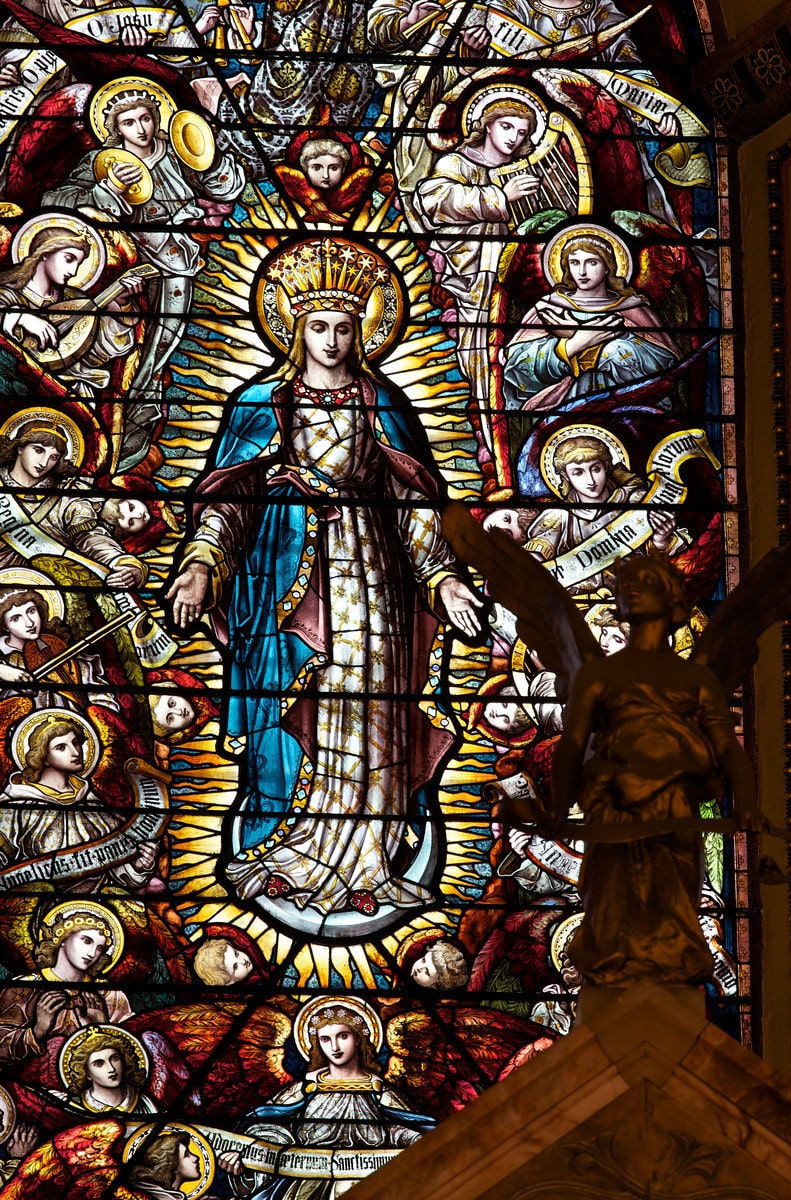August 15, 2017
Editor’s Note: Paulist Fr. Frank Desiderio preached this homily on August 15, 2017, the Solemnity of the Assumption of the Blessed Virgin Mary, at a Mass at the chapel at St. Mary’s of the Lake, the Paulist Fathers’ summer residence at Lake George, NY.
Remember the basic principle when talking about Mary,
Whatever we say about Mary,
we are saying about Jesus and
that says something about us.
The feast of the Assumption of the Virgin Mary into Heaven, says that when she died she was assumed bodily into heaven.
Usually when I preach on this I talk about the resurrection. I use the second reading from Romans, which talks about Christ the first fruits of the resurrection. This tells us those who belong to Christ rise. Christ defeats death. Christ defeats all evil.
Jesus rose from the dead so that we too can share in the resurrection. Mary, as the first disciple, is given a special place in sharing that resurrection. God assumed her into heaven to give her this primary place among the disciples.
Mary is assumed bodily into heaven is a reflection of this resurrection. And, what this says about us is that we share in this life with God after death. That’s the usual theme I follow. Today, I want to pursue another theme.
Today, I want to take as our starting point, the powerful image from Revelation. A women giving birth in the face of a dragon. Mary’s goodness is brave enough to face down the dragon. The woman faces evil and brings goodness into the world. That goodness defeats the dragon.
The goodness of Christ, as embodied in Christians, defeats evil in the world.
The belief about Mary being taken body and soul into heaven is an ancient one in the Church. It is not explicit in the New Testament but, in both the Western Church, the Roman Church, and the Eastern Church, the Orthodox Church, Christians have believed in what in the West is called the Assumption and in the East is called the Dormition of Mary, or the falling asleep of Mary.
The doctrine was defined explicitly and declared infallibly as a belief of the Church by Pope Pius XII in 1950. When then?
From the mustard gas in the trenches of World War I to the gas chambers of World War II the carnage against the human body was unimaginable.
This tremendous assault, this insult to the dignity of the human body had to be addressed. One way the Church could say something about the dignity of the human body was to talk about Mary’s body being taken into heaven.
In the face of monstrous evil, the woman was still giving birth to goodness in the face of the dragon. The maw of evil could not swallow the goodness of the Christ.
Because God assumed Mary’s body into heaven, the Church tells us that our bodies have a God-given dignity, first, because of our creation by God. And, our bodies have a God-given dignity because Jesus Christ came to us in a body like ours, sharing our flesh. By God’s creation and Jesus’ incarnation, we humans have a God-given dignity. St. Paul tells us our body is a temple of the Holy Spirit.
That God-given dignity of our human body is the foundation of so much of Catholic thinking. The dignity of the human body is the foundation of Catholic teaching on human sexuality, on sexuality, on labor, social justice and pro-life.
We treat our bodies with respect. We don’t hurt ourselves but live in a healthy way. We don’t degrade our bodies but we honor them. And we insist that others honor the dignity of the human person.
That is why Christians opposed Nazis in World War II and why we have to oppose modern day manifestations of the evil that says one race of humans is better than another race of humans.
This has to be a prime value for us, the dignity of the individual human person. All people are worthy of basic respect.
We treat our family members with respect, even the ones we don’t like that much. We respect undocumented workers or the check out clerk at the grocery store.
No matter who, as God has respected Mary so we are called to a basic respect for every human person. We don’t demean or demonize or disrespect God’s creation.
This doesn’t mean that we accept bad behavior but, as we seek to defeat evil, we treat all people as we want to be treated.
Today we celebrate not just Mary, that she is with God.
We celebrate that her present can be our future.
We too are destined to live with God.
That destiny means that we treat ourselves and others with the respect deserving of their God-given dignity.
Paulist Fr. Frank Desiderio is first consultor, or chief advisor, to the president of the Paulist Fathers. He also serves as director of the Paulist Associates and director of St. Mary’s of the Lake.
The image seen above shows the central stained-glass window at our mother church, the Church of St. Paul the Apostle in New York City.
